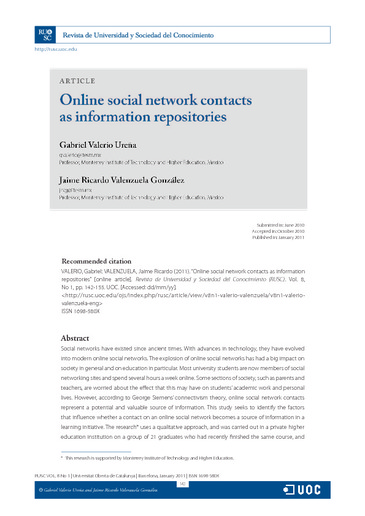| dc.contributor.author | Valerio Ureña, Gabriel;0000-0002-4446-6801 | |
| dc.contributor.author | Valenzuela González, Jaime R;0000-0003-3999-501X | |
| dc.creator | GABRIEL VALERIO UREÑA;287841 | es_MX |
| dc.creator | JAIME RICARDO VALENZUELA GONZALEZ;201468 | es_MX |
| dc.date.accessioned | 2016-06-01T13:01:25Z | |
| dc.date.available | 2016-06-01T13:01:25Z | |
| dc.date.issued | 2011-01-15 | |
| dc.identifier.issn | 1698-580X | |
| dc.identifier.uri | http://dx.doi.org/10.7238/rusc.v8i1.948 | |
| dc.identifier.uri | http://hdl.handle.net/11285/611379 | |
| dc.description | Abstract Social networks have existed since ancient times. With advances in technology, they have evolved into modern online social networks. The explosion of online social networks has had a big impact on society in general and on education in particular. Most university students are now members of social networking sites and spend several hours a week online. Some sections of society, such as parents and teachers, are worried about the effect that this may have on students’ academic work and personal lives. However, according to George Siemens’ connectivism theory, online social network contacts represent a potential and valuable source of information. This study seeks to identify the factors that influence whether a contact on an online social network becomes a source of information in a learning initiative. The research* uses a qualitative approach, and was carried out in a private higher education institution on a group of 21 graduates who had recently finished the same course, and on 13 university lecturers. The results show that the factors affecting whether online social network contacts become sources of information are: knowing about the contact; knowing what the contact knows; social closeness; the contact has a certain standing; knowing the contact in person, and; the contact is accessible. | |
| dc.description.abstract | Abstract Social networks have existed since ancient times. With advances in technology, they have evolved into modern online social networks. The explosion of online social networks has had a big impact on society in general and on education in particular. Most university students are now members of social networking sites and spend several hours a week online. Some sections of society, such as parents and teachers, are worried about the effect that this may have on students’ academic work and personal lives. However, according to George Siemens’ connectivism theory, online social network contacts represent a potential and valuable source of information. This study seeks to identify the factors that influence whether a contact on an online social network becomes a source of information in a learning initiative. The research* uses a qualitative approach, and was carried out in a private higher education institution on a group of 21 graduates who had recently finished the same course, and on 13 university lecturers. The results show that the factors affecting whether online social network contacts become sources of information are: knowing about the contact; knowing what the contact knows; social closeness; the contact has a certain standing; knowing the contact in person, and; the contact is accessible. | |
| dc.language | eng | |
| dc.relation | Investigadores | es_MX |
| dc.relation | Estudiantes | es_MX |
| dc.relation.isFormatOf | versión publicada | es_MX |
| dc.relation.ispartofseries | Vol. 8 | en |
| dc.relation.ispartofseries | No 1 | en |
| dc.relation.url | http://rusc.uoc.edu/index.php/rusc/article/view/v8n1-valerio-valenzuela/v8n1-valeriovalenzuela-eng | en |
| dc.rights | info:eu-repo/semantics/openAccess | |
| dc.rights.uri | http://creativecommons.org/licenses/by-nc-nd/4.0 | * |
| dc.subject.classification | 5 CIENCIAS SOCIALES | es_MX |
| dc.title | Online social network contacts as information repositories | |
| dc.type | Artículo | |
| dc.contributor.department | Tecnologico de Monterrey | en |
| dc.date.updated | 2016-06-01T12:20:11Z | |
| dc.subject.keyword | Online social networks | en |
| dc.subject.keyword | E-learning 2.0 | en |
| dc.subject.keyword | Virtual ethnography | en |
| dc.subject.keyword | Information repositories | en |
| dc.subject.discipline | Ciencias Sociales / Social Sciences | |
| refterms.dateFOA | 2018-03-07T08:21:51Z | |
| html.description.abstract | Abstract Social networks have existed since ancient times. With advances in technology, they have evolved into modern online social networks. The explosion of online social networks has had a big impact on society in general and on education in particular. Most university students are now members of social networking sites and spend several hours a week online. Some sections of society, such as parents and teachers, are worried about the effect that this may have on students’ academic work and personal lives. However, according to George Siemens’ connectivism theory, online social network contacts represent a potential and valuable source of information. This study seeks to identify the factors that influence whether a contact on an online social network becomes a source of information in a learning initiative. The research* uses a qualitative approach, and was carried out in a private higher education institution on a group of 21 graduates who had recently finished the same course, and on 13 university lecturers. The results show that the factors affecting whether online social network contacts become sources of information are: knowing about the contact; knowing what the contact knows; social closeness; the contact has a certain standing; knowing the contact in person, and; the contact is accessible. | |

